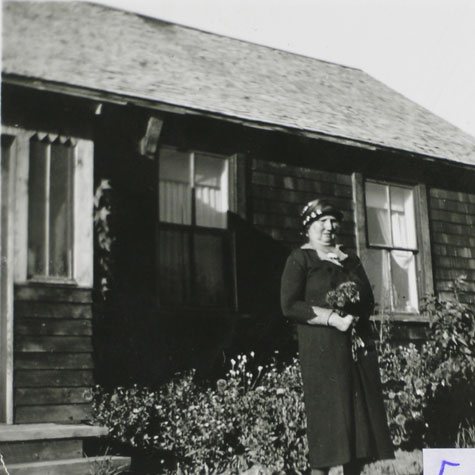A dark and cold winter morning… time to start the day…the wind is blowing outside…she can hear it in the trees outside the cabin. The floor is icy cold…time to get the stove going so that the day can begin. There are no lights to turn on… light the lantern… the water pail has ice in it… The older children who will be called out of their bed and given directions to help… dress the younger ones and keep watch until i get back… outside to get the cow some feed and water and take some of her warm milk for the children When it is light they will all be bundled in outdoor clothes, not to go out and play but to help with chores… carry wood for the stove after she chops it …check their snares and bring in the rabbits they have caught… haul water to the tiny cabin… feed and water the chickens and gather any eggs. By midday they are hungry again and they are all cold and wet. They will eat bread and jam… there is a little more milk.
All afternoon she spends baking the bread she started this morning …making a stew of the rabbit and some carrots and potato from the bin. They will have a good dinner. She spends the hour after the children are sleeping with some knitting…they always need mittens and socks…she banks the stove for the night and crawls into bed hoping that tomorrow she can do it all again…it would be so much easier if her husband was there to help. She listens to the wind and waits for sleep.
These women had no modern conveniences… no time-saving appliances… no ready-made anything. They did have hardship, disease, probably fear at being left alone, surely loneliness. Neighbours were few and far-between. For the very early settlers who had fled Estonia, it had to be terrifying to have left a country with a long history of settlement to come to a new land where they were offered opportunity, and little else.
They didn’t have the modern stress-causing situations: there were no regular trips to the dentist, or doctor’s appointments. They didn’t have to worry about catching a bus or running out of time on a parking meter. There were no credit card bills to worry about paying, and no need to fret about where they would be going for vacation.
For these women there was little respite and more work than anyone needed. They were brought from their homeland to the wilderness in a country where they had no common language except amongst themselves. They had only whatever culture they could preserve, while trying to sustain the children which most of them raised through the winters without their husbands. The men would go to work out in the mines in Canmore or later to Nordegg and return in spring. A homestead had to show improvement and while the men were home, the women worked beside them in the forests and fields. Here at least there was equality… a hard life for all.
My great grandmother came to Canada when she was 37 years old. With her she had 5 children from the ages of 4 to 10 years. Shortly after settling east of what became Sylvan Lake, my great grandfather Kristjan left her… ostensibly to scout out land in South America… but that is another story. How in the world she survived those early years, I can not imagine. When my father spoke of his grandmother, who remained on the original homestead until her death, he said that she still spoke Estonian, not English. She spent nearly fifty years in a country she probably never knew much about, outside of her piece of land. She raised her five children as a single parent. She never remarried and I can only hope that raising her family was gratifying enough to make her appreciate her own worth. I have a chart which has only been updated to include the fourth generation down from that original family. She left 5 children… they had 16 grandchildren… they left 29 great grands. We have had 43 great great grands, and on to my grandchildren’s generation.
As for my great grandmother, Christina (Tiina) Kingsep, I regret not having known her. However, everything that I am in some way measures a result of her tenacious spirit. I am sure that every woman who pioneered here in those days had a story of valor to match any soldiers’…they were not given medals or honours. Their contributions were expected and taken for granted … I believe that they deserve recognition for their accomplishments, and to this end I would like to honour these women pioneers by dedicating this version of “Their legacy, our heritage: Alberta Estonians” to them. Bless these women.

